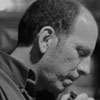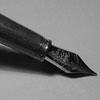This is an unpublished essay about the tribute concert for John Lee Hooker held in New York City in October of 1990. I was fortunate enough to be working only three blocks from Madison Square Garden the day the tickets went on sale, and got a pair of great seats. I invited a friend who I haven't seen in years, and had to coerce her to let me stand the price of the ticket because she was between jobs.
It was an amazing evening, during a week of blues events sponsored by a cigarette company that gave me my first chance to see Cephas and Wiggins in person, in the lobby of a midtown office building, and the chance to shake Willie Dixon's hand at a signing of his autobiography at Tower Records in the Village.
It's more than a decade ago. [When he died June 21, 2001,] he didn't make the front page of the Daily News (back then, I wouldn't have believed the Daily News would survive this long; they were in the midst of a terrible strike that fall) but he did get a blurb on the front page of the New York Times. His obit was half the length of Carroll O'Connor's, but perhaps that is in some way appropriate to the country we live in.
John Lee Hooker, New York City, 1990
The Business Is In Good Hands
By Ken Ficara
September, 1990
When he dies, chances are he won’t get the front page of the (New York) Daily News the way Leonard Bernstein did this week. But John Lee Hooker deserves it as much as Bernstein did, and one of the wonderful things about Bernstein was that he would have understood that.
But Hooker has gotten his due to a much greater extent than many of his contemporaries who were crucial in the shaping of everything we know as popular music in the US. It’s about time that 20,000 mostly white rock and blues fans came to their feet to pay him tribute; it’s heartening to see his children who have profited by his efforts to a far greater extent than he has--Gregg Allman, Johnny Winter, Joe Cocker--acknowledge that unpayable debt.
The crucial moment of Tuesday night’s all-star tribute to Hooker was during the all-the-stars-that-fit-the-stage finale, when he handed a mic to Joe Cocker and let him take the vocals. As Cocker belted it out, Hooker strolled the stage with his hands in his pockets, looking around approvingly, like a patriarch finally deciding the family business was going to be okay in the grandkids’ hands after all. John Lee Hooker might be one of the minority of blues pioneers to exit this world knowing that what he did was appreciated, and would be carried on by others who will not forget him.
You could see it near the end of the second set, as Hooker sat, guitar cradled in his lap, between Bonnie Raitt and Ry Cooder, two musical lights that both owe him a lot and aren't afraid to say so. Hooker and Raitt duetted on "In the Mood," a thirty-year old exercise in raw sexual tension that the two revived brilliantly on Hooker's latest album, winning a Grammy for their efforts. Raitt, with her smoky voice and stinging slide riffs, made everyone in the auditorium -- male and female alike -- feel the powerful sexual attraction of the seventy-year old man sitting next to her. Hooker's trademark growl turned into a chuckle a few times with the sheer joy of it all.
Then, Hooker launched into a long version of "Hobo Blues," a song about redemption, acceptance and something approaching contentment near the end of a very hard road. "At night I hear a freight whistle, lying in my bed, my baby by my side," he concluded, and Ry Cooder tugged an aching train whistle out of his guitar.
"Thank you, Ry," Hooker said.
As gala all-star tributes go, it was above par. Rather than clogging up the stage, most of the stars came on, did a few numbers, and got out of the way. And no one forgot why they were there.
At the end of the third set, Hooker came out for the last time to the hot pink folding chair reserved for him at the front of the stage. He sat down, and a roadie plugged in his guitar and handed it to him. But he gave it back, stood up, and motioned to the roadie to take away the chair. He tugged the wireless mic out of the stand, and started singing, leading the band through a lengthy boogie ride-out, then handed the mic to Joe Cocker. Willie Dixon, standing on the side of the stage grinning proudly, pounding his cane in time with the music, caught his eye. Better than a half-dozen guitarists vied for space, but at that moment, without singing a word or playing a note, Hooker owned the stage, and he knew it.

